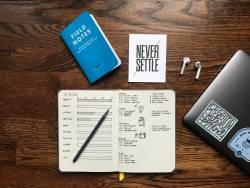
How to Change Your Behavior and Create Habits: Tiny Can Be Big

Heraclitus said it best, “The only constant in life is change.” But when we think of making change, why do we think big, and that big is better.
How we should be approaching this is:
- Baby steps
- Learn to crawl before you run
- Start small
These are all sayings we hear when we find ourselves standing face-to-face with change. And they are all true. To achieve the change we want to see in ourselves and our lives, we need a process and tools to make it easy and doable. That is what the book Tiny Habits by BJ Fogg is all about. The small changes that lead to personal transformation.
Let's delve into the best ideas from the book and how we can implement tiny habits, aka the building blocks of lasting change.
How to Eat an Elephant? One Bite at a Time
What happens when people try fad diets? They don't last. People seem to think that diving into the deep end will lead to success.
Tiny habits can be fast, they can start now, and they can grow. Take, for example, my desire to incorporate yoga into my life for better mental and physical health. Using the ABC's (Anchor, Behavior, Celebration) of tiny habits, this is how it looked:
1. Anchor Moment
An anchor moment is an existing routine event in your day that reminds you to do the new tiny habit. Identify reliable anchors and make them precise as possible. If I don't have to take the kids to school in the morning, this was my cue to use this time to do my yoga. If I take them to school in the morning, I do my yoga in the afternoon while they eat their snack.
2. Tiny Behavior
The next step is to make the new behavior or habit as tiny as you can. Start with less than 30 seconds. In the morning or afternoon, I had enough time to do at least one sun salutation. The great thing about starting tiny is that you can scale up anytime. Before long, I was doing ten sun salutations daily.
3. Instant Celebration
Celebrate right after to create those feel-good emotions. You deserve it! So, how do you celebrate? Any which way you like. Here are some ways:
- Smile
- Clap your hands
- Give yourself a mental tap on the back
- Do a power pose
- Say, "I did it!"
- Sing a victory song
- Do a little dance
- Give someone a high-five
Eventually, your tiny habits will become simple behavior that is automatic or ingrained and repeated without thinking about it.
Behavior Plays the Lead Role in Driving Action
It all boils down to behavior. The Fogg Behavior Model explains that MAP - Motivation, Ability, and Prompt - drives your behavior, your capacity to do the behavior, and when you do the behavior. All three have to be present, but you can have more of one and less of another.
What happens to New Year's resolutions? They slowly fade away not too long after. Motivation is high come January. While it may serve as a trigger to start a new habit, it does not help with the process. It is common for people to start changing their daily routine by adding extra workouts or eating healthy, only to have this motivation fade away over time.
Come February, and new habits come to a screeching halt. That's right, February! Lack of time, stress, and other factors become obstacles. It proves that motivation alone is not enough. To combat the effects of this, remember small changes and low expectations.
It begs the question: When motivation decreases, what will help you to continue? Your ability. But there's a catch. The harder the behavior, the less likely you will do it. The easier the behavior, that is, your ability to manage the behavior, the better the chances of it becoming a habit.
"Tiny is fast. Tiny can grow big." - BJ Fogg
Unfortunately, motivation and ability alone won't guarantee a successful behavior change. You require prompts. Prompts are triggers that result in action towards a chosen behavior, or by removing a prompt, you can disrupt a behavior you are not so keen on keeping. Want to exercise more - keep your exercise equipment front and center. Want to adopt healthy eating habits - remove junk food (prompt) from your kitchen cupboards (and the stash from your desk drawer!).
How Emotions Create and Dictate Habits
If you are wondering, how long does it take to form a habit? There's no one answer. It could be anywhere from 18 to 254 days. What's possible, that we do know from Tiny Habits, is that you can form a habit in a short time, a few days even. It does, however, rely on one thing: Having a strong positive emotion to the behavior.
Now, emotions can get the better of us. It's human nature to look at our shortfalls and failures instead of looking at the good and the little victories in our day. To transform how you use emotion, think of every win, every little success as a celebration. That little change can have a massive impact on shifting negative emotions or completely disregard them for more positive ones and help reinforce a habit.
Final Thoughts
One of the reasons why many people think change is hard - why I thought it was hard - is because of the way we approach it. In the wrong way!
Sustaining tiny habits will improve your life in many ways, whether that's by increasing self-confidence or improving your health. Like yoga, for me, one became ten. That's the scale and transformative power of tiny habits. And once you master them, they spill over into other areas of your life and lead to growth and multiplication habits.
Know what motivates you, define your aspirations, always start small, use prompts to take action, be positive, trust the process, scale-up, and don't forget to celebrate the little wins every step of the way.
“Habits may be the smallest units of transformation, but they’re also the most fundamental. They are the first concentric circles of change that will spiral out. Think about it. One person starts one habit that builds to two habits that build to three habits that changes an identity that inspires a loved one who influences their peer group and changes their mindset, which spreads like wildfire and disrupts a culture of helplessness, empowering everyone and slowly changing the world. By starting small with yourself and your family, you initiate a natural process that can create a tidal wave of change.” - BJ Fog













